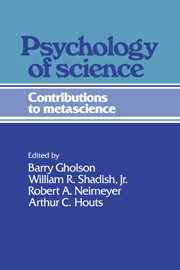Book contents
- Frontmatter
- Contents
- Preface
- Contributors
- 1 The psychology of science: An introduction
- Part I Historical issues in the psychology of science
- 2 Fragments of the fragile history of psychological epistemology and theory of science
- 3 Contributions of the psychology of science to metascience: a call for explorers
- Part II The case for a psychology of science
- Part III Creativity and the psychology of science
- Part IV Cognition in the psychology of science
- Part V Social factors in the psychology of science
- Part VI Epilogue and Prologue
- Author index
- Subject index
3 - Contributions of the psychology of science to metascience: a call for explorers
Published online by Cambridge University Press: 05 June 2012
- Frontmatter
- Contents
- Preface
- Contributors
- 1 The psychology of science: An introduction
- Part I Historical issues in the psychology of science
- 2 Fragments of the fragile history of psychological epistemology and theory of science
- 3 Contributions of the psychology of science to metascience: a call for explorers
- Part II The case for a psychology of science
- Part III Creativity and the psychology of science
- Part IV Cognition in the psychology of science
- Part V Social factors in the psychology of science
- Part VI Epilogue and Prologue
- Author index
- Subject index
Summary
In The Little Prince, St. Exupery (1943) describes the hero's encounter with a venerable scholar, the geographer, as follows:
“What is that big book?” said the little prince. “What are you doing?”
“I am a geographer,” said the old gentleman. “What is a geographer?” asked the little prince. “A geographer is a scholar who knows the location of all the seas, rivers, towns, mountains, and deserts.”
“That is very interesting,” said the little prince. “Here at last is a man who has a real profession!” And he cast a look around him at the planet of the geographer. It was the most magnificent and stately planet that he had ever seen.
“Your planet is very beautiful,” he said. “Has it any oceans?” “I couldn't tell you,” said the geographer. “Ah!” The little prince was disappointed. “Has it any mountains?” “I couldn't tell you,” said the geographer. “And towns, and rivers, and deserts?” “I couldn't tell you that either.”
“But you are a geographer!” “Exactly,” the geographer said. But I am not an explorer. I haven't a single explorer on my planet. It is not the geographer who goes out to count the towns, the rivers, the mountains, the seas, the oceans, and the deserts. The geographer is much too important to go loafing about. He does not leave his desk. But he receives the explorers in his study. He asks them questions, and he notes down what they recall of their travels. […]
- Type
- Chapter
- Information
- Psychology of ScienceContributions to Metascience, pp. 47 - 88Publisher: Cambridge University PressPrint publication year: 1989
- 8
- Cited by

